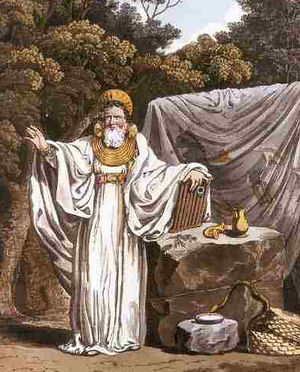Druids

The priest class of the ancient Celtic peoples, responsible for the education of the young and the intellectual life of the community. According to Julius Caesar, the Druids in Gaul were organized into a brotherhood that extended across Celtic tribal divisions. They were the judges for the Celtic peoples and wielded great political power. As the cohesive force among the Celtic tribes, the Druids were largely responsible for the rebellion of the Celts against Roman rule.
Education
Little unbiased information survives about the Druids, partly because they kept no written records but passed their knowledge down orally from generation to generation. Nevertheless, we know they played an important role in educating the young. It took twenty years to master the full Druidic curriculum, which included astronomy, arithmetic, geometry, medicine, poetry, law, natural philosophy, and public speaking. There were forty Druidic universities in Britain at the time of Christ. Their total enrollment was as high as sixty thousand students and included the British nobility as well as the sons of important men from all over Europe.
Theology
Nothing is certain about Druidic theology, yet some have asserted that it possessed numerous similarities to Christianity. Although the Romans eventually broke their power, the Druids yielded only to Christianity. Historian David Hume said, “No religion has ever swayed the minds of men like the Druidic.”[1]
The Druids taught the immortality of the soul and, according to Byzantine historian Procopius, worshiped a non-polytheistic Trinity. Its aspects were known as: Beli, the Creator, as regards the past; Taran, the controlling Providence of the present; Yesu, the coming Saviour of the future. According to Reverend Dobson, the Druid Godhead was called Duw—the one without darkness who pervaded the universe. “Three golden rays of Light were the emblem of Druidism, representing the three aspects or persons of the Trinity emanating from the Godhead.” Dobson concludes that “Druidism thus anticipated Christianity and pointed to the coming Saviour under the very name by which Christ was called.”[2]
Druidism has been connected with another mystical school—Pythagoras’ academy. Over the years, scholars and seers such as Manly Palmer Hall have noted the similarities in the teachings on the afterlife. Geoffrey Ashe writes, “The doctrine of transmigration fascinated the Greeks particularly, because the same had been taught by their own arch-mystic Pythagoras. They speculated as to whether the druids had learnt from him.”
Origins in Atlantis
The akashic records reveal that the Druids have their origins in Atlantis and that England today is the island remnant of Atlantis. Its peoples carry a very ancient tradition of the mysticism of the geometry and science of energy and its interchange, the intonation of the Word, and so many of the mysteries that were lost with the sinking of that continent.
Jesus and the Druids
Glastonbury tradition says that the boy Jesus accompanied Joseph of Arimathea on one of his business trips to England and lived there for several years, studying and preparing for his mission. Reverend Dobson does not think it unlikely that Jesus studied Druidism. He writes:
May it not have been that Our Lord, bringing with Him the Mosaic law, and studying it in conjunction with the oral secrets of Druidism, prepared to give forth His message, which occasioned so much wonderment among the Jewish elders? In Britain He would be free from the tyranny of Roman oppression, the superstition of Rabbinical misinterpretation, and the grossness of pagan idolatry, and its bestial, immoral customs. In Druid Britain He would live among people dominated by the highest and purest ideals, the very ideals He had come to proclaim.[3]
The Druids and Stonehenge
Historians believe that Stonehenge, the prehistoric megalithic structure which they estimate was built between 1900 and 1600 B.C. on Salisbury Plain, England, was used as a Druid temple. The arrangement of the stones, according to British astronomer Gerald Hawkins, enabled the ancients to accurately measure solar and lunar movements as well as eclipses.
See also
For more about Jesus in Britain, see Joseph of Arimathea.
Sources
Pearls of Wisdom, vol. 25, no. 58.
Heart magazine, winter 1985 issue.
Elizabeth Clare Prophet, July 4, 1978.
